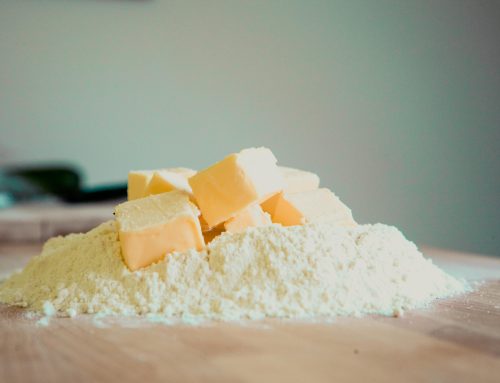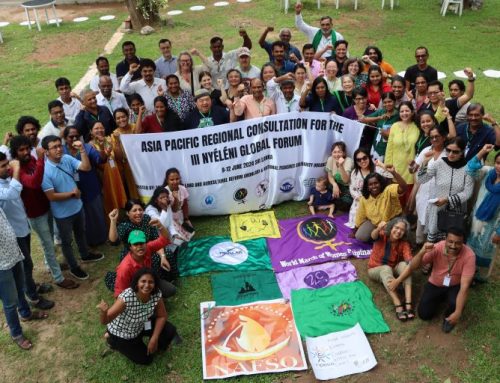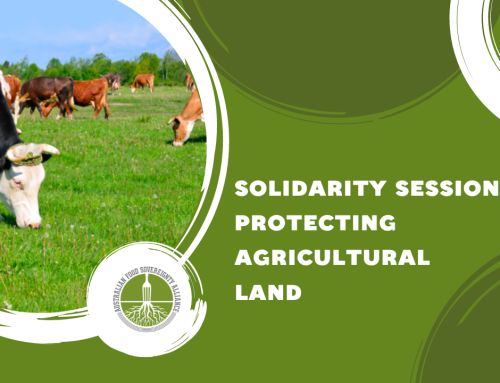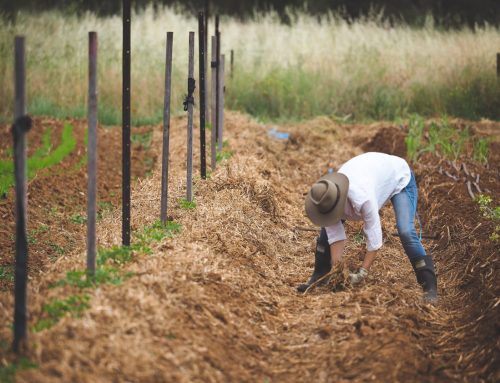Story by Ed Beil, May 2014
I own a sixteen hectare fruit farm at Oakdale on the south western rim of the Sydney Basin, approximately an hour’s drive from the Sydney CBD, with my wife Marilyn, in a partnership for the last 25+ years. I previously worked as a NSW Police Detective and a Logistics Manager. We bought the land, planted and developed the orchard, ‘from scratch’; learning along the way.
The farm now employs up to 7 local people on a casual basis, helping us pick, pack and prune the orchard, while I manage all the other operations by myself.
The orchard is modern, using efficient automated drip irrigation from a sustainable underground water source. It is fully netted against hail, bats and birds that could decimate the crop. We minimise chemical inputs into our farm by practicing Integrated Pest Management. I transport all the fruit we grow on the day it is picked to nearby Sydney. My aim is to produce high quality, safe and tasty fruit.
In recent years my farming activities have made a small profit some years, moderate losses other years. This is in keeping with many small farmers in the area. The vagaries of weather, prices and economic conditions have led to these types of businesses teetering on the point of remaining, or closing. The returns, when compared to the capital employed, and the huge rise in costs and land values, make the economic arguments of remaining in such a business, all negative.
Small farmers in the Sydney Basin and indeed adjacent to all large metropolitan areas both here and worldwide, provide incredible social, economic, strategic, environmental and health benefits to the nearby cities. I could go on and list more benefits from farming, but space and time does not allow.
There has been much said about the reasons for the decline of farming in the Sydney basin. However let me assure you that the demise of small farming in the Basin is not caused by inefficient production, lazy farmers, wrong produce being grown or any of the multitude of imposts we face, although these play a major role when we have to compete against cheap food imports.
As one of the few remaining farmers in the Sydney Basin it is in my interest to work for a sustainable support system for our farmers to stay on the land. Here’s a pragmatic scheme that would retain farming as a Sydney region livelihood and benefit the development industry at the same time. Imagine an Agriculture Enterprise Credit Scheme (AEC) loosely based on the City of Sydney’s Heritage Floor Space Scheme. That scheme rewards owners of heritage buildings undertaking restoration with floor space credits. The AEC would see square meter credits earned on the food produced by the farm, the actual food produced.
The farm credits would be based on the farmgate value of food produced on the area designated as desirable to retain for food production in any given year. The greater the value of food produced, the more the saleable credits that would be offered for purchase by developers. This would earn extra income for the producers of the fresh food.
The scheme would reward existing food production in the rural zones adjoining Sydney by providing the farmer with bankable credits based on the amount of food produced in any year. These square meter productive area-based farm credits would be purchased by developers and used to intensify already-approved developments capped at a set rate in targeted development areas. The income earned from the sale of the credits would augment the farmers’ yearly income.
Many farmers in areas adjoining major urban centres cannot avail themselves of economies of scale because they are spread out due to cultural and economic circumstances. They are unable to jointly market their produce effectively for these reasons and are forced to be ‘price takers’. Nevertheless, they are very close to being profitable and therefore sustainable over the long term.
A scheme as described above would provide a little extra income to support farmers. This perhaps could be something to keep farmers on the land and change the tide in their favour for once. It would also promote agriculture in peripheral metro regions to owners of non-productive land and bring that land into local food production.
Developers of property also have an incentive to participate in the AEC scheme, because it would allow intensification of property developments up to a maximum set by government. This linking of urban food production and property development would potentially increase property developer profits and at the same time act as a counter to urban sprawl. The AEC scheme could target urban renewal areas, commercial, industrial and even green-field residential development sites. The extent of intensification could be set for each area, thus limiting the amounts of square meter credits to each site.
The farm credits to farmers could also be managed according to the agricultural industry involved. Priority could be given to crops that are deemed to be more desirable than others, ensuring more farm credits would be earned by these crops. The city benefits from sustainable and profitable agriculture being retained on the urban fringe. People benefit from a better environment instead of concrete and tiles from the coast to the mountains. They also have fresh food on their doorstep, thereby improving public health and urban food security.
The proposed AEC scheme offers a classic triple bottom line solution – a win-win. All it needs to start is political will and public support. Let’s hope this happens before we lose all our remaining Sydney farms.
About Ed Beil:
Ed is a fruit grower at Oakdale on the south western rim of the Sydney Basin. His farm the Wanaka Orchard is a 16 hectare property which he owns with his wife Marilyn, in a partnership for the last 25+ years. Ed formerly worked as a NSW Police Detective and a Logistics Manager. He studied Horticultural Management by distance education, at The Orange Agricultural College/University of New England.
Ed farms mainly peaches, nectarines, plums, apricots and some citrus, which he sells either on the Sydney wholesale market or at various farmers markets in the Sydney area. Ed is part owner and chairman of the Warwick Farm Trackside farmers market. He is passionate about retaining farmers close to Sydney to help promote food security for Sydney, as well as maintaining a healthy environment for Sydney’s residents, and a connection with ‘the land and its food resource’.
[button_link url=”mailto:ebiel@bigpond.net.au” target=”” style=”” title=”” class=”” id=”” onclick=“”] Contact Ed by email >>>[/button_link]






